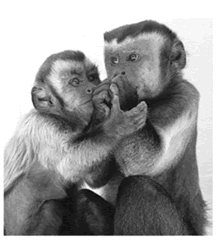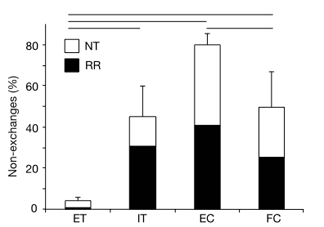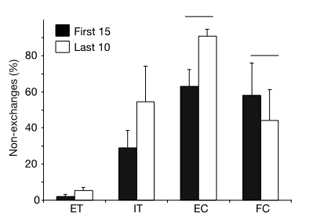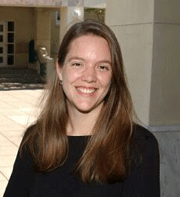« September 2004 | Main | November 2004 »
October 04, 2004
Nonhuman primates discovered to have a sense of fairness
MONKEYS REJECT UNEQUAL PAY

A juvenile capuchin monkey exhibits cheek-to-cheek begging to an eating adult male, cupping his hand next to the adult's food in solicitation. This primate is exceptionally tolerant and readily shares food, which may be a precondition for the reported reactions to reward division.
Humans judge fairness according to both the distribution of gains and possible alternative outcomes. There may be species-specific responses concerning the way one ought to be treated in a society and how gains should be distributed. For example, species with highly developed food sharing and cooperation, such as the Capuchin monkeys, may have emotionally-charged predispositions for various expectations about how gains should be distributed. A recent study in Nature by Sarah F. Brosnan and Frans B. M. de Waal examines the responses of 5 female capuchin monkeys to an unequal distribution of gains during experimental exchange with a human experimenter. Females were paired and observed under four exchange conditions: 1) both females received the same reward, 2) one female received a superior reward, 3) one female received a superior reward without exchange (i.e., no work), and 4) a single female observed a superior reward in the absence of a partner.
Monkeys too, it seems, respond negatively to an unequal distribution of gains. They will respond negatively to a previously acceptable gain if their partner receives a better one. Clearly if these emotions evolved in humans to aid in long-term human cooperation, they may exist in other species as well.
"In preliminary studies, two conditions were used: equality, in which two monkeys exchanged tokens with a human experimenter to receive cucumber, and inequality, in which one monkey exchanged for cucumber and its partner for grape, a more favoured food. Whereas in previous tests males and females had been equally reliable exchangers, only females reacted differently to the two conditions. Compared with equality tests, females receiving the less favoured reward in inequality tests were less willing to exchange, whereas males showed no such effect. Our limited sample size did not allow a conclusive comparison of the sexes, but independent evidence indicates that capuchin females pay closer attention than males to the value of exchanged goods and services."

Percentage of failures to exchange for females across the four test types. Black bars (RR) represent the proportion of non-exchanges due to refusals to accept the reward; white bars (NT) represent those due to refusals to return the token. Lines indicate significant differences between conditions (Tukey's multiple comparisons). ET, equality test; IT, inequality test; EC, effort control; FC, food control.

Mean percentage of failures to exchange in the first 15 trials (black bars) versus the last 10 trials per test (white bars). Lines at top indicate significant differences.
Quotes:
"During the evolution of cooperation it may have become critical for individuals to compare their own efforts and pay-offs with those of others. Negative reactions may occur when expectations are violated. One theory proposes that aversion to inequity can explain human cooperation within the bounds of the rational choice model, and may in fact be more inclusive than previous explanations. Although there exists substantial cultural variation in its particulars, this 'sense of fairness' is probably a human universal that has been shown to prevail in a wide variety of circumstances. However, we are not the only cooperative animals, hence inequity aversion may not be uniquely human. Many highly cooperative nonhuman species seem guided by a set of expectations about the outcome of cooperation and the division of resources."
"Failure to hand back a received token (NT) is a highly unusual response in our trained capuchins: in two years of bartering, such failures occurred in less than 5%of trials, as also seen in the equality test. The marked increase in failure to exchange in individuals receiving the lower-value reward in the inequality test and the two control conditions cannot be explained by the absence of positive reinforcement, as rewards continued to be cucumber, an accepted reward in the equality test. Even more curious than a drop in the conditioned response rate was the second manner in which exchanges failed: refusal to accept or consume the reward (RR). In doing so, subjects forfeited a directly accessible food that they readily accept and consume under almost any other set of circumstances."
"One possible explanation is that reward rejections relate to violated expectations, in which monkeys forego a low-value reward if a high-value one is anticipated. On the basis of her own reward history, however, there would seem no reason for a subject receiving cucumber to expect anything else during the same test."
"Capuchin monkeys, too, seem to measure reward in relative terms, comparing their own rewards with those available, and their own efforts with those of others."
"As opposed to primates marked by despotic hierarchies, tolerant species with well-developed food sharing and cooperation, such as capuchins may hold emotionally charged expectations about reward distribution and social exchange that lead them to dislike inequity."
About the authors:
Dr. Frans B. M. de Waal;

Currently, Frans B.M. de Waal is the Charles Howard Candler Professor of Psychology and Director of the Living Links Center at the Yerkes National Primate Center, both at Emory University. Born in 1948, in the Netherlands he was trained as a zoologist and ethnologist in the European tradition at three Dutch universities Nijmegen, Groningen, Utrecht), resulting in a Ph.D. in biology from the University of Utrecht, in 1977. His dissertation research concerned aggressive behavior and alliance formation in macaques. In 1975, a six- year project was initiated on the world's largest captive colony of chimpanzees at the Arnhem Zoo. Apart from a large number of scientific papers, this work found its way to the general public with Chimpanzee Politics (Johns Hopkins University Press, 1982).
Frans B.M. de Waal homepage
Dr. Sarah F. Brosnan

Currently Dr. Brosnan is a postdoctoral fellow in the department of anthropology at Emory University. Her primary interests are the evolution of social behavior and social cognition, particularly the cognitive processes underlying cooperation and reciprocity and economic behavior. Specifically, what interest her is the proximate mechanisms underlying such behaviors, particularly how animals perceive the value of different commodities in their reciprocal interactions (i.e., goods and services exchanged within a biological market) and how the social environment affects the acquisition and use of such a concept of value. Currently she is working on a number of different projects in both humans and nonhuman primates (particularly chimpanzees) in an effort to understand more about the evolution of cooperative and economic behavior across the primate lineage.
Sarah F. Brosnan homepage
Posted by DSN at 10:40 PM | Comments (0)
October 03, 2004
Employment opportunities in decision science
I. MIAMI UNIVERSITY - Miami, Florida.
Miami University, Assistant Professor in the area of Judgment and Decision-making. The Department of Psychology at Miami University invites applications for a tenure-track position, to begin August 2005, at the assistant professor level in judgment and decision-making. Successful candidates will show promise for conducting outstanding research, mentoring doctoral students, and providing high-quality teaching and research supervision at the undergraduate level. Our department offers doctoral programs in Brain and Cognitive, Social, and Clinical Psychology. We anticipate moving into a new spacious, and well-equipped building in 2006. Applicants must have completed the Ph.D. by August 2005. Applicants should submit curriculum vitae, reprints or preprints, research and teaching statements, and three letters of reference supporting both research and teaching excellence to: Robin Thomas, Chair, JDM Search Committee, Department of Psychology, Miami University, Oxford, OH, 45056, FAX (513) 529-2420 (www.muohio.edu/psychology). Review of applications will begin November 1, 2004, but applications will be accepted until the position is filled. Miami University is an Equal35 Opportunity /Affirmative Action employer, applications from women and minorities are especially encouraged.
II. MASSACHUSETS INSTITUTE OF TECHNOLOGY - Cambridge, Massachusets
The Management Science area at the MIT Sloan School has three faculty openings in the areas of Operations Management, Operations Research and System Dynamics. We are primarily looking for people at the level of Assistant or untenured Associate Professor. Applicants are expected to have a strong methodological research base, the potential for research and teaching excellence, and an ability to contribute to application areas of high impact. At least one of the appointments will be in the area of applied probability, stochastic processes and their applications. We particularly want to identify qualified female and minority candidates for consideration in these positions.
The OM/OR/SD Groups support MBA, PhD, BS, and Executive education programs. We have a broad range of well-supported research programs, including the MIT Operations Research Center, the Leaders for Manufacturing Program, the Integrated Supply Chain Management Program, the Center for Innovation on Product Development, the Entrepreneurship Center, and the Center for eBusiness@MIT.
Information about the Alfred P. Sloan School of Management can be found at: http://mitsloan.mit.edu
Applicants should possess a PhD in a relevant field by the date of appointment. Applicants must submit hard copies of the following: an up-to-date curriculum vitae, copies of representative publications, a statement of their objectives and aspirations in research and education, an official graduate transcript, information about teaching interests, experience and performance, and at least three letters of recommendation by December 15, 2004.
Please send applications to: Chair, OM/OR/SD Faculty Search Committee (indicate your primary field of interest), c/o Ms. S. Nemat-Nasser, MIT Sloan School, 50 Memorial Drive E53-360, Cambridge, MA 02142-1347.
MIT is an equal opportunity employer committed to building a culturally diverse and pluralistic intellectual community and strongly encourages applications from women and minorities.
-John Sterman
Jay W. Forrester Professor of Management
Director, MIT System Dynamics Group
MIT Sloan School of Management
E53-351
30 Wadsworth Street
Cambridge, MA 02142
617/253-1951 (voice); 617/258-7579 (fax), jsterman@mit.edu
http://web.mit.edu/jsterman/www
III. UNIVERSITY OF CALIFORNIA-BERKELEY - Berkeley, California
Pending budgetary approval, the Department of Economics is seeking applicants for a tenure track opening at the assistant professor level or an opening at the associate or full professor levels with tenure, at 100% time for academic year 2005-06. The field is open.
Qualifications for the tenure track opening include: a Ph.D. in Economics or a related discipline, at or near completion; the potential for significant research accomplishment and for distinguished teaching at both the undergraduate and graduate levels. Applicants must send a resume, one research paper, and arrange for submission of three letters of recommendation. Qualifications for the tenured opening include outstanding research accomplishment and the capacity for distinguished teaching at both the undergraduate and graduate levels. Applicants must send a resume and the names of three references.
Please refer your referees to the University's statement on confidentiality, found at http://www.chance.berkeley.edu/apo/evalltr.html. The application deadline is December 7, 2004. Applications submitted after the deadline will not be considered.
MIT is an equal opportunity- affirmative action employer.
CONTACT: Personnel Committee/Recruitment (for tenure-track applicants) or Maurice Obstfeld (for tenured applicants), Department of Economics, 549 Evans Hall #3880, University of California-Berkeley, Berkeley, CA 94720-3880.
IV. CORNELL UNIVERSITY - Ithaca, New York
As seen in the 17 September issue of Science:
THE NEW LIFE SCIENCES INITIATIVE at Cornell University
CORNELL UNIVERSITY HAS ANNOUNCED A $600-MILLION INITIATIVE to recruit faculty and provide resources that foster the multidisciplinary study of organisms in the post-genomics era. This faculty-driven effort serves to integrate the life sciences with Cornell's outstanding programs in the physical, engineering, and computational sciences through 13 interconnected, campus-wide focus areas composing The New Life Sciences Initiative. Having begun in 1998 and extending through the next five years, Cornell is in the process of making 110 professorial appointments, establishing a new graduate fellowship program, creating new research core facilities, and building several major capital projects. Active faculty searches are listed on the next three pages. For more information, please visit our websites: http://www.genomics.cornell.edu/, http://lifesciences.cornell.edu/about/initiative.php, and http://vivo.library.cornell.edu.
Neuroscience
Cornell University invites applications for three junior faculty positions in neuroscience that use:
(1) Genomic/genetic, developmental, molecular, computational, and/or biophysical approaches to the study of excitable cells or tissues (contact David Lin at dml45@cornell.edu for more information);
(2) Cell and/or developmental approaches to study the functional organization of the nervous system; for this position, we especially seek individuals with expertise in murine model systems that will contribute to a university-wide interdisciplinary mouse program (contact Tony Bretscher at apb5@cornell.edu for more information); and
(3) Integrative approaches to CNS function with interests that could include, but are not limited to, the organization of sensory or motor systems; social behavior, social communication, social cognition; emotion or any other aspect of cognition such as learning and memory at the network level, spatial navigation, or decision-making; a variety of current recording or imaging techniques would be welcome (contact Barbara Finlay at blf2@cornell.edu for more information).
Search for more jobs:
American Economic Association
CareerBuilder.com
The Economist Classifieds
PhDs.org
ScienceCareers.org
Posted by DSN at 06:19 PM | Comments (0)